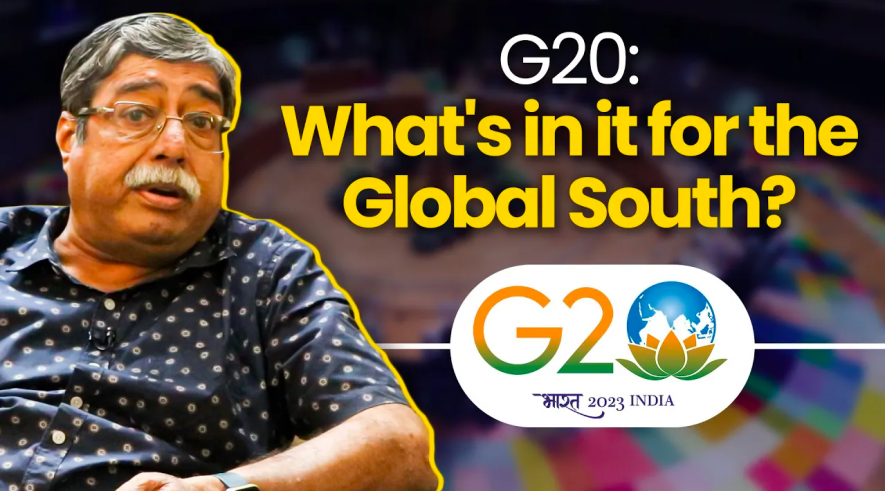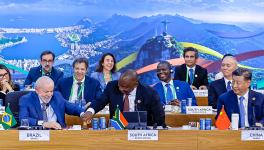Systematically, G20 has Been Driven by G7: Biswajit Dhar

The G20 summit is slated for later this week on September 9 and 10. There is a kind of breathlessness in the air among the authorities and mainstream media on the coverage of the event.
The Indian government has gone all out with claiming the G20 presidency this year as a feather in its cap.
But what can the developing countries, including India, expect from the G20? What is the background of this grouping and how does it relate to what other groupings, including from the global South, are doing today. NewsClick’s Pragya Singh discusses these issues with Biswajit Dhar, a noted economist and specialist in trade policy and former professor of economics at JNU's Centre for Economic Studies and Planning. Edited transcript of a video interview.
Pragya Singh: It is being said that G20 is going to respond to the priorities of the Global South and will be based on an inclusive and balanced international agenda. Your views?
Biswajit Dhar: Let me pick up three areas …that are related to the global economy in a very broad sense.
The first is the whole issue of climate change, which is intimately linked to economic well-being and the global economy.
The second issue is the question of developing country debt – indebtedness -- which has been hanging for a long time, especially the debt of low-income countries.
And, the third issue is the question of reforming multilateral development banks. And these are the financial institutions beyond the Washington-based Bretton Woods institutions. They're also Asian Development Bank and the Regional Development Banks. So, there's been a discussion on reforming these agencies and make them more development oriented.
So, first, climate change. I think it's very clear to anyone experiencing the problems of variable weather
and uncertain weather conditions that climate change is something that should have been dealt with maybe a few days ago, not today.
What we are seeing is this big battle going on between the developed and the developing countries on the question of first, the ‘net zero’; when it is going to be achieved. And the second is how it is to be achieved. And the how is largely being discussed in the context of climate finance.
So, the West wants us to do the whole net zero or meet the net zero target ASAP, by 2050. That is what they talk about. India has said ‘No’, and we have asked for more time.
But in the middle of all this, what is not being discussed is that the framework was really that countries are going to do the mitigation adaptation according to their ability.
So, there was this common but differentiated responsibility, both in terms of how much you will do and, of course, common but differentiated responsibility also on the basis of whether there are enabling conditions. That is where the climate finance issue comes in.
I think there was a need to actually do a comprehensive review of the entire landscape. Who can do how much? This is very important because climate change is not something that if you just think that a few countries are going to do it, the problem will go away. So, the transboundary implications of carbon footprint in different countries makes it imperative that everyone is on the same page.
And, therefore, enabling all the countries to be on the same page is the responsibility of the global community. So, as of now, climate finance is the most disappointing story. It has not been forthcoming, and was not forthcoming before the pandemic.
And after the pandemic, it has become a kind of a mirage, because the developed countries are now busy putting their house in order. So, the kind of priming that the Americans did, the Biden administration did and onward, the kind of funds the US is pumping in to support an industrial policy because it wants to sort of get decoupled from China. That is a big question mark, of course.
So, availability of finance is going to be a problem.
Somewhere I think there has to be a discussion in the G20 as to who is going to bear the burden of financing in the global community to get on to this sort of meeting the ‘net zero’ target reasonably quickly.
That is not something that the Indian presidency is going to be able to come to terms with.
PS: Why do you say so?
BD: That’s the reason I said that even before the pandemic not much funds were coming. And now, these guys are putting in money in their own economies and sort of trying to de-globalise, if I may use that term. This is what is happening.
So, there is going to be further pressure (on climate finance). There was a need to take a realistic view as to how this is going to be done.
There are a number of factors that come in. For instance, the sole issue of trying to set their own agenda of de-globalisation at a very critical juncture is also something that feeds into the whole climate issue. Because, like I said, that the kind of money that US is pumping in (on de-globalisation) will certainly have an implication on the availability of finance for climate.
The second issue that we have not been discussing at all seriously is the equation of technology. There had to be a consensus on availability of critical technologies.
We saw how the West just looked the other way during the COVID pandemic. The developing countries kept insisting that the stranglehold of IPR (intellectual property rights) should be removed so that the developing countries can get access to these technologies, the vaccine and the medicines.
This was not done. So, in the worst kind of a pandemic, we did not see any response on the technology front from the advanced countries.
On climate, this has been a long story. Somewhere down the line the focus went off from the technology aspect almost entirely and shifted to the domain of finance. And that was another big mistake, I think, that the developing countries made.
India, in particular, was a very strong advocate of technology transfer. I would say even this term ‘technology transfer’ is not really an appropriate term because technologies are never transferred. These are bottom-sold in the marketplace.
And the terms on which you will be able to get the technology is the critical element.
And on this particular aspect, there had to be a global consensus. And forums like G20 are the ones where this kind of a decision should have been taken. And this is something that we were actually hoping would happen.
When the G20 was upgraded from a finance minister's platform to a summit-level meeting of these member countries. And the G7 brought in a bunch of emerging economies, the immediate trigger was to find a response to the economic downturn of 2008. So, the first summit was held in 2008 and then it started happening every year.
And the question that we have been asking all the time is that what is the point of developing countries being on the high table if issues that are of critical importance to these countries are not raised in the manner that they should be.
PS: So, apart from technology transfer and negotiations on climate change, which you say have not gone in favour of what’s now called the Global South, the developing countries, what are the other important issues?
BD: So, the second issue that I am going to raise is the question of the external debt of developing countries. Now, the first major debt crisis of the developing countries happened in the 1980s. And there was no resolution which was worth talking about from a developing country perspective. All that happened was that the American administration, together with the IMF and World Bank, was able to find a way or model through providing additional funding to these indebted countries so that they do not default on their debt.
So, all the consideration was that there shouldn't be a crisis that the financial market faces.
So, what was done was the rescue of the financial market, the big banks. The banks, they were too big to fail, all these investment banks like JP Morgan and others. And the developing countries were left to their own fate. And then came the structural adjustment programme and then the entire burden of adjustment was on the developing countries.
PS: You're actually telling us about the history of G20. How from the G7, these countries that were economically progressing were added and as it was seen as advantageous to have them all. That is what the G20 is?
BD: That's right. But what I was telling you is that look, the debt crisis has a history and it's never been resolved. So, when you fast forward and then come to the COVID pandemic, that's where the direct role of G20 can be seen. In the wake of the pandemic, the G20 took a decision that the debt servicing problems of low- income countries, and there were initially 73 countries, then 69 countries, which had really serious debt overhang, a very large debt burden. Their debt servicing problems will be reduced. It's not as if there will be some write-offs.
The only thing that was being discussed was that they had to repay the debt, they had to service their debt, pay the interest and the principal-- that will be waived for a period of time, and G20 just talked about this.
Now, what also was on the table was not the entire debt stock, because the debt that these countries had accumulated had three sources. First is bilateral debt, bilateral loans that were given, government-to- government kind of loans.
The second is private sector lending, and the third is lending by the multilateral development banks, such as World Bank, IMF and regional development banks.
So, there are three components. So, what did the G20 decide? They said the debt servicing obligations of these countries that they owe to the official creditors, i.e, the government, only that component of debt servicing will be postponed. So, it was called the debt service suspension initiative -- DSSI.
So, what is the problem with this?
Now, the problem with this is, like I said, that there are these three sources. One of the smallest components for many countries is the official creditors. The largest in most cases is private creditors, and they are not touched.
PS: And this is the component which you actually highlight in a paper that you wrote published in India Forum, that it has gone up from $14 billion in the 2010s to a decade later at about $83 billion.
BD: That is right. So, look at the extent to which private lending has increased to these countries. So, something had to be seriously done in order to decrease the debt that these countries owe to private creditors. So, there has to be a write off. Now, that is not on the table. It was not discussed at all.
PS: Do you think the G20 will become a forum this time to discuss this?
BD: No, the G20 has been discussing this from 2020.
PS: The private aspect of the law?
BD: No. No. No. I am saying that the overall thing has been discussed.
Even now the G20 is only saying that private creditors are invited to support this initiative. But there is no binding commitment. And they (private creditors) do not have to take a binding commitment.
PS: In other words, there is no reason why they should feel encouraged to come on board this initiative at all.
BD: See, unless a proper commitment is brought on a particular set of agencies, they will not actually budge an inch. But the situation is that even if there are commitments, they will still not budge. So, the first thing that you need to do is to bring a certain amount of commitments to them. But that is not happening.
And the reasons are quite obvious. The reasons are that the developed countries will be extremely wary of touching private creditors. That is the nature of the political economy. Because, they have always been supporting these big financial institutions. And whenever there has been a crisis, these financial institutions have been given big assistance by the government and all in the name of “too big to fail”. So, when this is the reality, then you cannot expect poor countries getting any kind of relief from private creditors.
Now, why is this external debt issue important for these countries?
First is that, you know, if you have this burden of debt, now see it as a parallel from any sort of individual household, that if a person, if a family owes a huge debt, then this family's future looks completely in the dark.
So, these countries, which now have to implement things like what was discussed earlier -- the climate commitment and reducing the carbon footprint -- are in a situation that if they take any additional funding from anywhere, they just can't sustain it, they will completely collapse.
The only option they will be left with would be to declare insolvency. But unlike a lot of the private sector companies, the big ones who declare insolvency and get support from the government and then get back on track, for governments, this can be a very difficult situation. So, apart from their development imperative, their future, anything else these countries want to do, will be directly impinging on the debt liabilities they are carrying forward.
PS: In the same India Forum paper, you mentioned the G20 Montreal meeting in 2000, where they spoke about the benefits of globalisation and integration of economies. So, this doesn't sound like the agenda for the Global South, as people understand it.
Yet, this is still the agenda for the G20 meeting. So, in a sense, the G7 does not engage with the agenda of the Global South, but speaks about it. It's just words?
BD: Absolutely. You know, the first thing that you need to understand is the G20 and the question: what is the point of the developing countries being on the high table? Are their voices heard? They are not. Because what you can see is that systematically the G20 has been driven by the G7. So, G7 is basically G20, which has gone through a process of G7isation.
So, all these agenda of the North-South come up but nothing of the South is actually discussed.
The third aspect is the reform of the multilateral development banks. Now, we all know that the IMF and the World Bank are sitting on the laps of the US and can't take a decision other than what the Americans want because of the voting shares. Now, the shareholding of US is in excess of 16%. And for any critical decision to be taken by the IMF for instance, you need a support majority of 85%.
So, no decision can be taken without the US coming on board. And there has been a discussion going on for a long time and India and China have been pressing for this that the fund and the bank should reflect today's reality and the emerging economies’ presence should also be reflected in the voting shares, the current voting shares of the IMF.
Now, that has not happened.
So, the whole framework is -- starting from the multilateral banks, development banks that are always adopting policies -- have not favoured the developing countries.
Going forward, the kind of relief, if at all, that has to be given to the low-income countries, can't be decided without the Americans coming on board, and they are not willing to do that. So, basically the G20 has got caught in this web that has been created by the G7.
And they are moving us exactly in the way they want it in the direction that they want.
I would like to mention one final point and one final issue which is on the multilateral trading system. It is completely broken and we thought that G20 would do something. India has been talking about its support for the multilateral trading system. And the fact that the dispute settlement body of the WTO (World Trade Organisation) is broken because of the Americans, many of us were hoping that at least this issue is discussed seriously and a way is found out of this long-term. And at least the pressure of the 18 other countries will be put on the Americans to change their position. There has been no evidence of that.
Again, the news reports even in India keep talking about how India is resolving various disputes even with the US on its own. Or, they have decided this on the TRIPS issue, on a patents issue or even, I think, the sugar dispute is still pending.
So, this perception is being created that countries are resolving their problems on their own and the WTO dispute settlement mechanism is sort of an abeyance.
PS: Is that really possible?
BD: No, no, it is a very dangerous line to take. I am firmly of the view that we need this multilateral set of rules in order to counter the big guys. The big guys do not need
this multilateral trading system because they have the economic might.
And they have shown it time and again. Trump went on a unilateral kind of
trip of increasing tariffs on a lot of products and did whatever.
And now Biden is giving these kinds of huge subsidies to the semiconductor and whatever industries in order to propel their industrial policy. Or anti-dumping duties from time to time
in various countries. So, they can do whatever. But it is the developing countries that need the WTO in order to resolve the disputes in a manner that does not hurt them…..
Those who are actually talking about it must look at the way the Americans make their policies.
Whenever the Americans are defining their policy objectives, they say that we are actually doing this to benefit our businesses, our workers, farmers,etc.
It is a sovereign country and it is a democratic country. It has its mandate from its people. So, it is supposed to actually look after the interests of its own people….
So, on its own it is never going to give up its own fundamental interests. Only when you bring it out on a multilateral platform and then you say that there are trade-offs. …
And this is all about trade-offs. So, of course, while we have agreed to trade-offs, we have not got a fair bargain. Even in the WTO we have not got a fair bargain.
It is impossible to think of a situation where India can actually bargain with the Americans and get a fair deal. And if it is so claimed and if you do not know the details, surely something has happened that we do not know about...
PS: Yes…because there is a lack of transparency around these kinds of arrangements as well.
BD: That’s right…. We know that we are under pressure to change our Patents Act. We are under pressure to change our policies. We have been changing our policies in ABC areas. So, it will be foolhardy to say that we are sticking to our guns. That we are actually being able to dictate terms to the Americans and the Americans have accepted exactly what we wanted to tell them.
Get the latest reports & analysis with people's perspective on Protests, movements & deep analytical videos, discussions of the current affairs in your Telegram app. Subscribe to NewsClick's Telegram channel & get Real-Time updates on stories, as they get published on our website.























